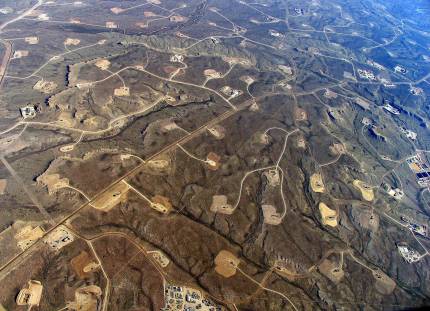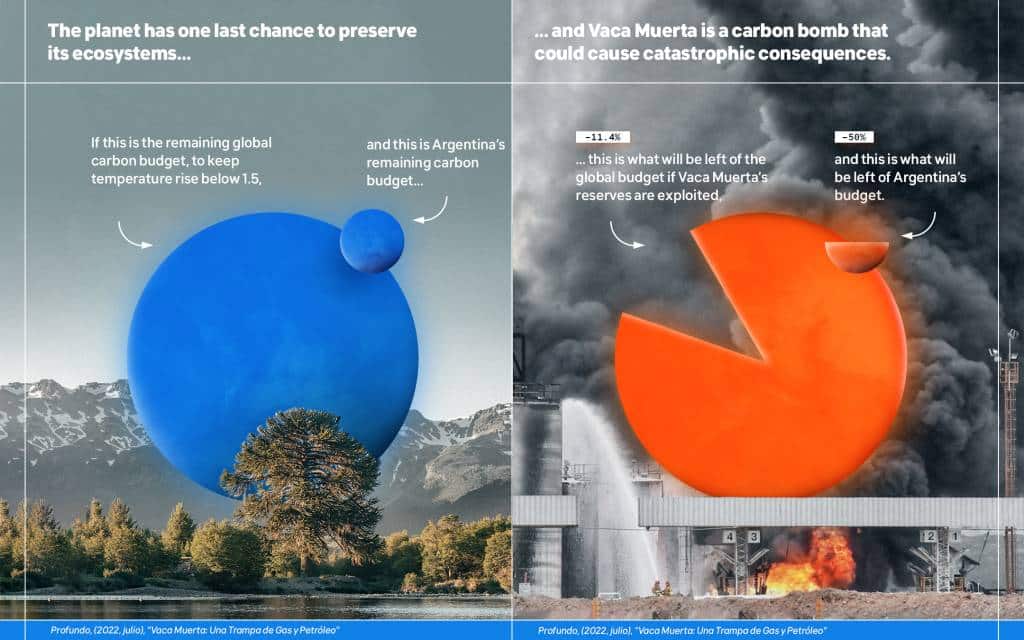
In the run-up to the world’s leading climate conference, COP27, 350.org issues a warning to the world: the fossil fuel reserve of Vaca Muerta could become a real “carbon bomb”, with detrimental impacts on Argentina’s development and global temperatures.
Vaca Muerta contains the second-largest reserve of shale gas and the fourth-largest reserve of shale oil in the world, which are extracted through fracking, a complex and high-impact technique that had not been used before in Argentina.
If fully exploited and burnt, the oil and gas contained in the Neuquén Basin, of which the Vaca Muerta is the largest field, will release into the atmosphere a volume of CO₂ equivalent to 11.4% of the global CO₂ budget, that is the entire volume of CO₂ that can be emitted between now and 2050, if humanity wants to limit global warming to 1.5 °C, as defined in the Paris Agreement.
The data is part of the report “Vaca Muerta: an oil and gas trap”, which 350.org published on October 13. In the week of its publication, the organization highlighted the hidden economic costs of oil and gas exploration in the country, which make the Argentinean reserve an “economic bomb”. Now, as the vast majority of countries prepare for COP27, 350.org draws attention to the climate disaster that the fossil fuel sector could cause.

“Vaca Muerta is one of the world’s biggest carbon bombs. The companies, banks and governments involved in oil and gas activities in Argentina are declaring every day, through their actions, that their earnings matter more than the well-being of our species and all other species on the planet,” says Argentinean activist Victoria Emanuelli, 350.org’s Latin America campaign coordinator.
By way of comparison, if all the oil and gas that exists in Vaca Muerta were burnt in 50 years, the annual CO₂ emissions would be equivalent to 49.3% of the total annual emissions that Argentina itself has targeted for 2030 in its NDC (Nationally Determined Contribution). It is expected that part of the fossil fuels extracted in Vaca Muerta will be burnt in countries other than Argentina, which would reduce this percentage, but even so, the impact on meeting the country’s climate targets tends to be gigantic.
350.org also warns that Vaca Muerta concentrates a significant share of exploration profits in the hands of foreign companies, including some based in countries that ban fracking, such as the UK and France. In this sense, oil and gas extraction in Argentinean Patagonia reinforces climate colonialism, through a relationship that enriches rich countries and leaves Argentina with the most of the environmental, climate and socio-economic costs.
“European and US fossil fuel companies know that their space in developed countries is shrinking, due to pressure for climate action, and are trying to transfer their activities to the Global South. It would be wise for Argentina to protect itself from this trap, because the political and economic cost of betting on dirty energy will be higher and higher”, says Gerard Rijk, asset analyst at the Dutch consultancy Profundo and co-author of the report.
For Argentina to get out of the Vaca Muerta trap and accelerate its development, it requires a just energy transition that puts the needs of the most vulnerable communities above the oil and gas lobby.
“We have huge renewable energy potential, and we can redirect the resources that today subsidize fracking towards activities that benefit people and the planet. The decision to leave Vaca Muerta behind is in our hands”, says Victoria Emanuelli.
Read the report “Vaca Muerta: an oil and gas trap” (link)
The post Vaca Muerta is a “carbon bomb” that could eat up more than 11% of the global CO₂ budget appeared first on 350.


0 Commentaires